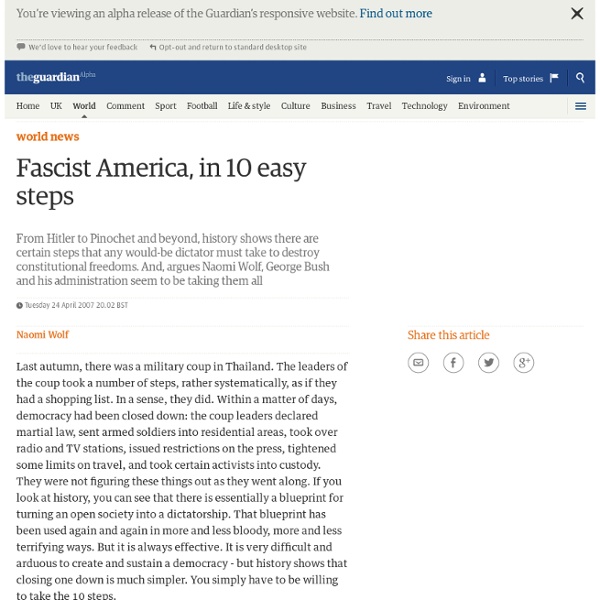Naomi Wolf: Fascist America, in 10 easy steps

What's the government buying these days? Hollow point bullets, hardened checkpoint booths and radiation pills
(NaturalNews) You can tell a lot about a person by assessing what they purchase. It's called "consumer profiling," and corporations do it all the time. That's how those grocery store loyalty discount programs work, by the way -- they profile your psychology by analyzing what you're buying. From that information, they can target you for coupons, mailers and other marketing campaigns that "magically" speak to your particular interests. It's not magic, of course; it's just behavioral profiling. So what happens if we profile the purchasing behavior of the U.S. government? Bullets, bullet-proof roadside checkpoint booths, and anti-radiation pills. Just a few weeks ago, the federal government initiated a contract for acquiring 450 million rounds of .40 caliber ammunition. Question: What does DHS intend to do with 450 million rounds of barrier-piercing hollow point ammunition? The really important answer is that no one buys hollow point bullets for target practice. The DHS is a domestic agency.
European History/A Background of European History
Introduction[edit] A fresco from Pompeii showing a scene from the myth of Europa. This scene represents the capture of Europa by Zeus who had disguised himself as a bull. This book presents a broad overview of European history, from the end of the Roman empire to the present day, roughly from the fifth century to the twentieth century. This is, of course, a somewhat arbitrary period, but not a wholly unuseful one. Neolithic Era (7,000 BCE to 3,000 BCE) The neolithic period is characterized by the spread of agriculture and pottery. The Aegean Sea and Southern Europe The earliest evidence for european agriculture is found at Knossos, Crete and dates from the sixth millennium BCE. On the mainland of central Greece in the region of Thessaly; hundreds of neolithic dwellings have been discovered through field archaeology, arial mapping and spectrum analysis by satellites. Northern Europe The Bronze Age (3,000 BCE to 700 BCE) The Classical Period (700 BCE to 500 CE) The Parthenon in Athens.
An un-American response to the Oslo attack - Glenn Greenwald
Over the last decade, virtually every Terrorist plot aimed at the U.S. — whether successful or failed — has provoked greater security and surveillance measures. Within a matter of mere weeks, the 9/11 attacks infamously spawned a vast new surveillance statute (the Patriot Act), a secretly implemented warrantless eavesdropping program in violation of the law, an explosion of domestic surveillance contracts, a vastly fortified secrecy regime, and endless wars in multiple countries. As it turned out, that massive over-reaction was not a crisis-driven anomaly but rather the template for future actions. The reaction to the heinous Oslo attack by Norway’s political class has been exactly the opposite: a steadfast refusal to succumb to hysteria and a security-über-alles mentality. He called on his country to react by more tightly embracing, rather than abandoning, the culture of tolerance that Anders Behring Breivik said he was trying to destroy. Multiple provisions of the U.S.
US Congress passes authoritarian anti-protest law
By Tom Carter 3 March 2012 Defend democratic rights! Support the Socialist Equality Party election campaign! For more information and to get involved, click here. A bill passed Monday in the US House of Representatives and Thursday in the Senate would expand existing anti-protest laws that make it a felony—a serious criminal offense punishable by a lengthy prison term—to “enter or remain in” an area designated as “restricted.” The bill—H.R. 347, or the “Federal Restricted Buildings and Grounds Improvement Act of 2011”—was passed by unanimous consent in the Senate, while only Ron Paul and two other Republicans voted against the bill in the House of Representatives (the bill passed 388-3). H.R. 347 expands an existing federal criminal statute – Title 18, Section 1752 of the United States Code, or the “restricted buildings or grounds” law. Under existing law, the areas that qualify as “restricted” are defined in extremely vague and broad terms. The timing of the bill is significant.
DRUDGE REPORT 2013®
Related:
Related:



